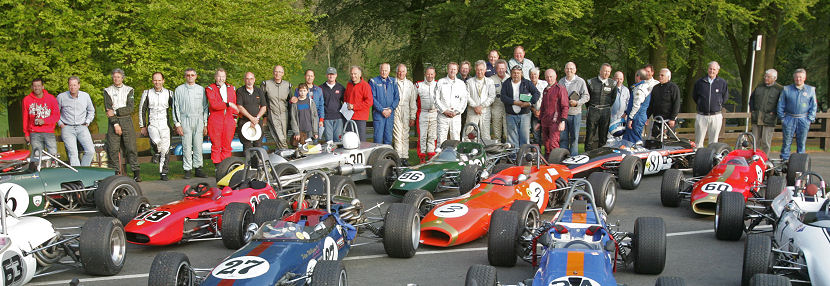Version 2025.1 published January 3rd, 2025
2025 Sporting Regulations
Introduction
The aim of the Historic F3 1000cc European Trophy is to create a revival of the great international F3 races of the 60’s by encouraging the use of One Litre Formula Three cars in a series of races held in a warm, friendly but competitive spirit.
Eligible Cars
One litre single-seater Formula 3 cars built between January 1st, 1964 and December 31st, 1970 to the FIA defining regulations in place at that period; separated in two classes.
Class A for cars built between 01/01/1964 and 31/12/1966 with side draught carburettor and wheels to a maximum width of 6.5”.
Class B for cars built between 01/01/1967 and 31/12/1970 or any car running with a downdraught carburettor and/or wheels wider than 6.5”.
Scoring and sporting regulations will be identical in class A and B, separate trophies will be awarded to the winner of each class.
All cars must comply with the rules of 1970 Appendix "J" Article 295 and current Appendix "K" and must remain in their original period specifications.
Competitors and Drivers
The Historic F3 1000cc European Trophy is open to any driver in possession of a valid race licence issued by his/her National Sporting Authority.
Registration
All drivers must be a member of the Historic F3 1000cc European Trophy and register by returning the membership registration forms together with the membership fee to the Historic F3 1000cc European Trophy before the first round.
Entry
At least one month before each race, the organisers undertake to provide each registered competitor with full details of the relevant race including entry fees, closing dates, and any other necessary information. It is the competitor’s responsibility to ensure that their entry, together with the correct entry fee is submitted before the closing entry date; any errors and oversights will not be the responsibility of the organisers.
Races and Schedule
Races are provided by duly authorised clubs operating under the National Sporting Authority of the country concerned; and under their entire authority and responsibility. The race schedule is published annually and will be issued to all registered competitors.
Advertisement
The organisers of the Historic F3 1000cc European Trophy require all competitors to reserve a space of 50 cm by 20 cm on each side of their cockpits for use by potential sponsors.
Classification
Points will be awarded in each race on the following basis.
| 1st | 20 | points |
| 2nd | 16 | points |
| 3rd | 15 | points |
| 4th | 13 | points |
| 5th | 12 | points |
| 6th | 11 | points |
| 7th | 10 | points |
| 8th | 9 | points |
| 9th | 8 | points |
| 10th | 7 | points |
| 11th | 6 | points |
| 12th | 5 | points |
| 13th | 4 | points |
| 14th | 3 | points |
| 15th | 2 | points |
| 16th | 1 | point |
| 17th | 1 | point |
| 18th | 1 | point |
| Pole Position | 2 | points |
| Fastest Lap | 1 | point |
| Qualifying | 1 | point |
| Starting | 1 | point |
At ‘Double Header’ meetings, each race will be scored separately, each competitor must complete at least 50% of race distance to be entitled to position points. In the event of nine or more races counting towards the championship, competitors taking part in all of these events will be required to deduct two scores. In the event of eight or fewer races, one result will be deducted. The winner of the Historic F3 1000cc European Trophy is the competitor awarded the highest number of points during the season. In keeping with the spirit of the series, the winner has the honour of organizing the championship award dinner.
Liability
The organisers of the Historic F3 1000cc European Trophy do not accept any responsibility for any incident or accident happening to any competitor or any member of his or her team. The individual competitors and team members are considered to be acting on their own responsibility.
Additional Sporting Regulations
Any driver competing in the trophy may be called before a meeting of trophy stewards who, at their discretion, may take further action that could include exclusion from part or all of the trophy. The organisers will use any evidence available to them to request that the trophy stewards investigate any drivers who are deemed to show poor driving standards or bring the trophy into disrepute in any such manor through on and/or off track incidents. This will include complaints from officially registered competitors. Trophy stewards are empowered to consider any request from the organisers to penalise any competitor for any breach of trophy regulations and, after holding a formal hearing if they deem it necessary, to impose a penalty.
One or more of the following may be imposed by the Trophy stewards as appropriate:
- Suspension from all or part of the trophy.
- Grid position penalty.
- Loss of points up to a maximum of two scores.
The trophy stewards are designated at each event by the trophy board.




